Students Become Citizens of their Own Country as they Study Canadian Government and Human Geography
The Civic Mirror is an outstanding resource that allows students to experientially cover the learning outcomes in the Canadian Government and Human Geography units in Social Studies 11, better preparing them for the provincial exams. Below we have outlined how teachers can use the program and its learning modules to maximize student engagement and interest in the curriculum.
COURSE INTRODUCTIONS

We strongly recommend introducing the Civic Mirror (event 1) and running the Practice Run (event 2) in the first week of classes. Introducing CM at the start allows you to emphasize the built-in rewards system, which will motivate your students to work extra hard. (3 days)
UNIT 1: CANADIAN GOVERNANCE
As students build their Civic Mirror nation, they’ll actually be learning how Canadian law and government works. Budget 17 – 20 lessons (3.5 weeks) for this unit. Here’s a quick synopsis:
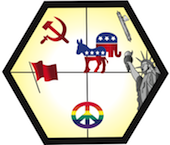 POLITICAL SPECTRUM: Using our Political-Economic Spectrum module, students cover these major ideologies before receiving their Civic Mirror Hidden Agendas. Starting this way will also provide students with a foundational understanding needed for the history unit. (4 lessons)
POLITICAL SPECTRUM: Using our Political-Economic Spectrum module, students cover these major ideologies before receiving their Civic Mirror Hidden Agendas. Starting this way will also provide students with a foundational understanding needed for the history unit. (4 lessons)
THE CHARTER + HUMAN RIGHTS & FREEDOMS: Introduce students to the Canadian Constitution Acts, The Charter, and Human Rights and Freedoms with the Civic Mirror’s Pre-Game Constitutional events. As well, you may want budget extra time for our Rights, Freedoms, and Responsibilities of Democratic Citizenship module too. (3 lessons)
ELECTIONS AND POLITICAL PARTIES: Pair the The Game of Canadian Politics module (which covers Canada’s electoral system, its political parties, platforms, and electoral reform) with the Civic Mirror’s election events. (5 lessons)
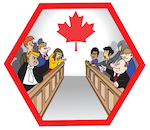
PARLIAMENTARY / FEDERAL SYSTEM: After the elections, students read our Canada’s System of Government module and preview the Civic Mirror’s game events (i.e. House of Commons, Town Hall, and National Court). Previewing the CM Game Events makes the content meaningful because students will be running their own country very soon! (3 lessons)
PROPERTY AUCTION: Save the Hex Auction for the end of this unit (as a reward). Once done, the student will have mastered the unit content, and will by dying to start running their own country. (1 lesson)
UNIT 2: HUMAN GEOGRAPHY UNIT
The Civic Mirror’s connections with this unit are incredible. Your students’ Civic Mirror nation will be one reeling with economic, environmental, and political issues. This will help them understand and appreciate the global issues being studies in S.S.11. In fact, with the exception of the population issues outcomes (which needs to be taught separately), the Civic Mirror with our National Standards of Happiness and National Standards of Living modules cover all the outcomes in this unit.
We recommend scheduling 2 simulated years for this unit, devoting 1.5 weeks to the first simulated year and the study of world population issues, and the remaining weeks for the rest of the content.
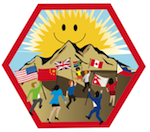 ECONOMIC DEVELOPMENT VS. ENVIRONMENTAL ISSUES:
ECONOMIC DEVELOPMENT VS. ENVIRONMENTAL ISSUES:
Our National Pursuits of Happiness module addresses the big questions every nation is confronted with: what are the most important issues that governments should address so that their citizens can pursue happiness. Not only does the module cover huge swaths of SS11 curriculum, but it leverages the Civic Mirror experience to make the content real in the minds of the student.
POVERTY CYCLE: Because the Civic Mirror starts with economic shortages, many students will understand poverty like they never did before. They will incur family deaths and struggle to make ends meet in the simulation. As your students work through the National Standards of Living module, ask your them to consider how the poverty cycle exists in their own country.
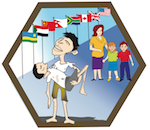
NATIONAL INDEXING: The National Standards of Living module was written to cover the various issues that result in nations being classified as underdeveloped, developing, and developed. In fact, the module asks students to use national indexing measurements to compare and contrast their country against real world ones, analyzing factors like literacy rates, mortality rates, health care, government corruption, etc. One student group reported:
“Our country is like Nigeria! We have a corrupt government, an energy problem, no health care or education, no welfare programs or social safety net, and our country is run by an oligarchy who’s only interested in making money.”
UNIT 3: HISTORY UNIT
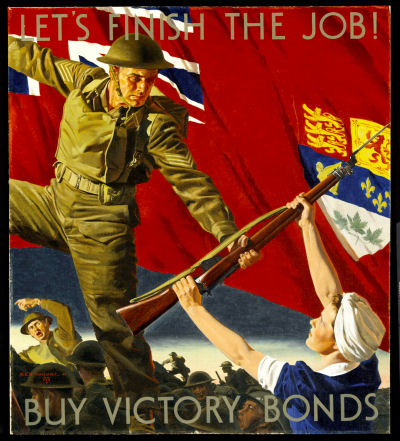 Throughout the first two units, every third class (roughly) involves a Civic Mirror event. When you shift to the history unit, we recommend scheduling CM Events once a week to keep things fun and alive. Because of the sheer amount of information students must cover in this unit, we recommend easing off on the frequency.
Throughout the first two units, every third class (roughly) involves a Civic Mirror event. When you shift to the history unit, we recommend scheduling CM Events once a week to keep things fun and alive. Because of the sheer amount of information students must cover in this unit, we recommend easing off on the frequency.
That said, there is still enough curricular relevance to continue on with it. For example, many of your students will be able to empathize with the humiliation felt by the citizens who had to stand in line to get their government assistance cheques because similar activity is happening in their own country. Or, your students will ‘get’ the political platforms of the Canadian parties over the past 100 years because they will have created and voted for their own political parties, each with its own platform.
In sum, after participating in the Civic Mirror, the content in the SS11 history unit will simply make more sense for your students because they will be able relate to it. Their participation in The Civic Mirror will provide them an experiential frame of reference that will help them better understand – and appreciate the significance of – the historical events they are being asked to study. That is, of course, so long as you – the teacher – help them make these connections through guided reflection and instruction.
SOCIAL STUDIES 10 ALTERNATIVE
If you think this scope and sequence is too tight for your delivery of SS11, check out our sensible idea of integrating the Civic Mirror and SS11’s Canadian Governance unit with the Social Studies 10 curriculum.
